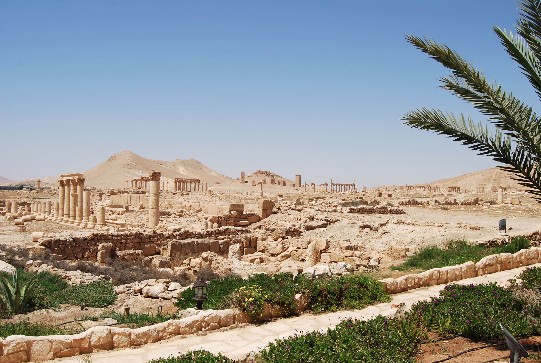 Overlooking Palmyra, Syria
Overlooking Palmyra, Syria
Risks of Arming Syrian Opposition Group Against ISIS
As the quest to fight and eliminate the Islamic State (ISIS/ISIL/Daesh) continues, the US government has considered many options to secure victory, including aiding opposition groups in the region. One group that has surfaced as a potential ally is Ahrar al-Sham, a large opposition force in Syria. Although the group is more than willing to fight ISIS, the US government remains skeptical when it comes to providing monetary aid and weaponry because of the group’s Islamist affiliations.
Who are Ahrar al-Sham?
– “Free Men of the Levant (Syria)”
– Number in the thousands
– Coalition of other Syrian Islamist opposition groups
– Members are mostly homegrown fighters from Syria
– Very few members from outside Syria
– Followers of Salafism (ultra-orthodox strain of Sunni Islam)
– Opposed to the regime of Bashar al-Assad
– Also against ISIS
The US is reluctant to support Ahrar al-Sham because of the risk and possibility that any monetary or military aid given to them might fall into the wrong hands. An even greater risk is that Ahrar al-Sham will become a dangerous group after it completes its goals in Syria. Skepticism on the part of the US seems justified, given the historical precedent of supporting armed groups during the Afghan-Soviet War.
The fear of indirectly empowering another group like al-Qaeda is a crucial factor in deciding whether to aid Ahrar al-Sham or not. Ideally, the US would like to support an opposition group that is both able to fight ISIS and the Assad regime and is willing to establish a democratic system of government afterwards. Ahrar al-Sham is clearly against ISIS and Assad, but is not willing to establish a democracy afterwards. Instead, it has called for the establishment of a Sunni theocracy in post-Assad Syria; one that would supposedly protect minorities and allow the people to choose the government. In other words, they reject the idea of a secular, Western-like democracy.
In addition to its rejection of secular democracy, another major concern regarding Ahrar al-Sham is its collaboration with the Nusra Front, which is a Syrian affiliate of al-Qaeda. Although the Nusra Front has not officially merged with Ahrar al-Sham, the two groups have collaborated on the battlefield for tactical reasons. From a US perspective, combat collaborations with the Nusra Front would open up the possibility that any weapons given to Ahrar al-Sham could end up in the hands of the Syrian al-Qaeda affiliate.
With few viable options on the table, a policy of caution when considering whether to aid opposition groups and rebels is better than fully committing to arming them and hoping that the situation plays out in the US’ favor. Ahrar al-Sham and the US might be on the same side against ISIS and Assad right now, but there’s no telling what will happen in the future in a post-Assad Syria and post-ISIS Middle East, especially without sufficient planning for a variety of outcomes.





